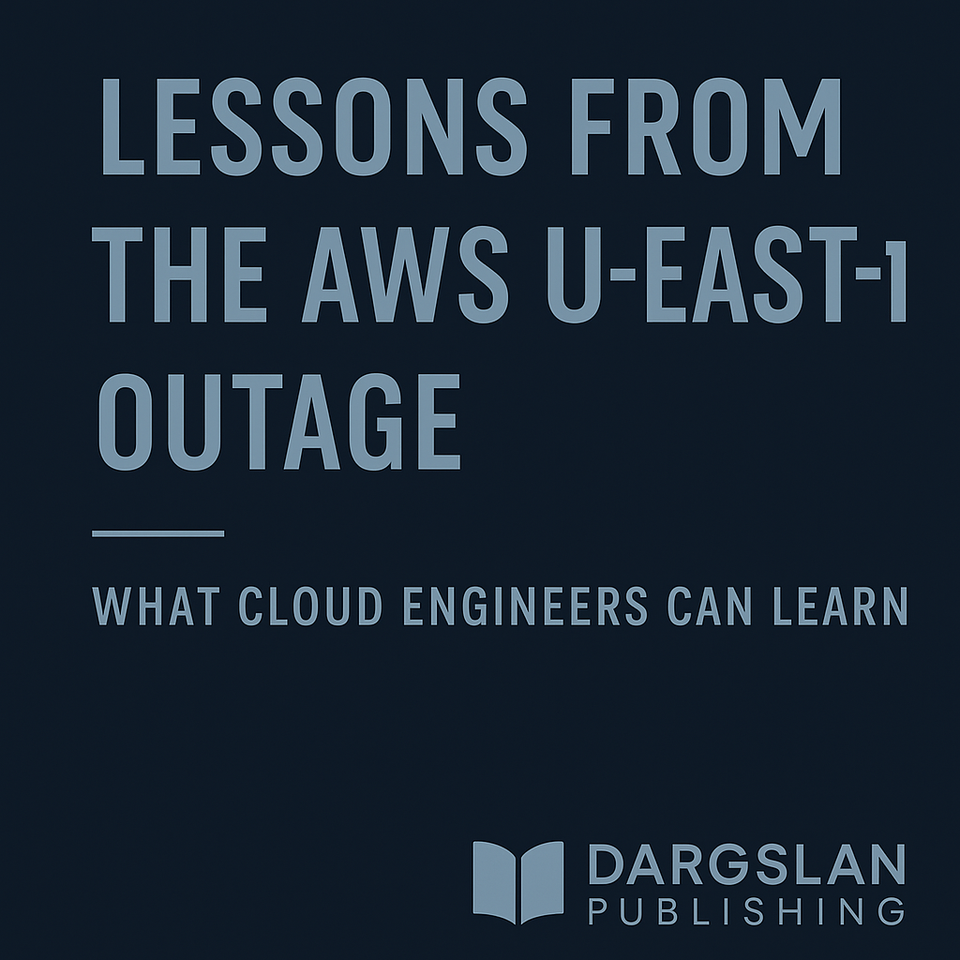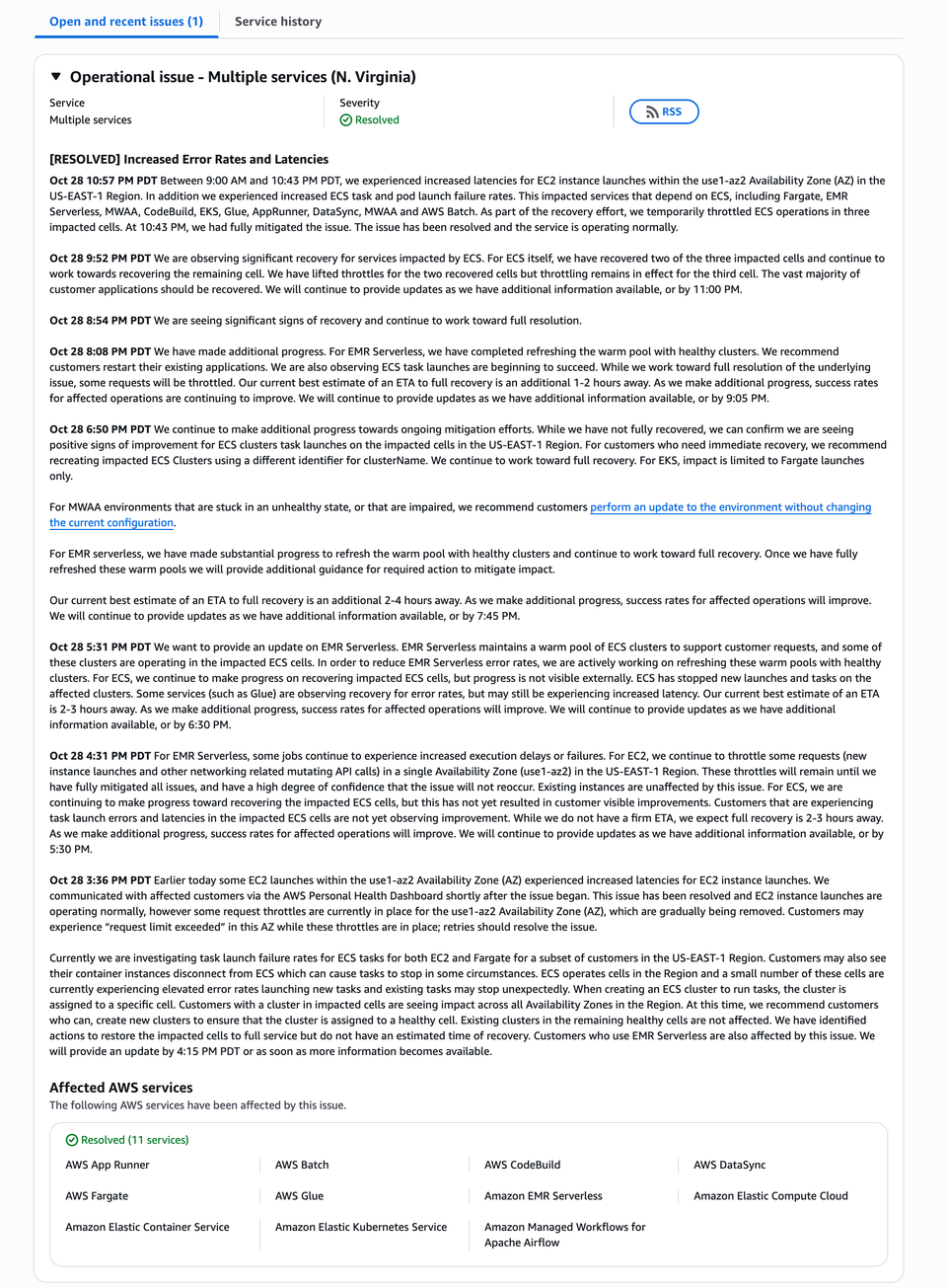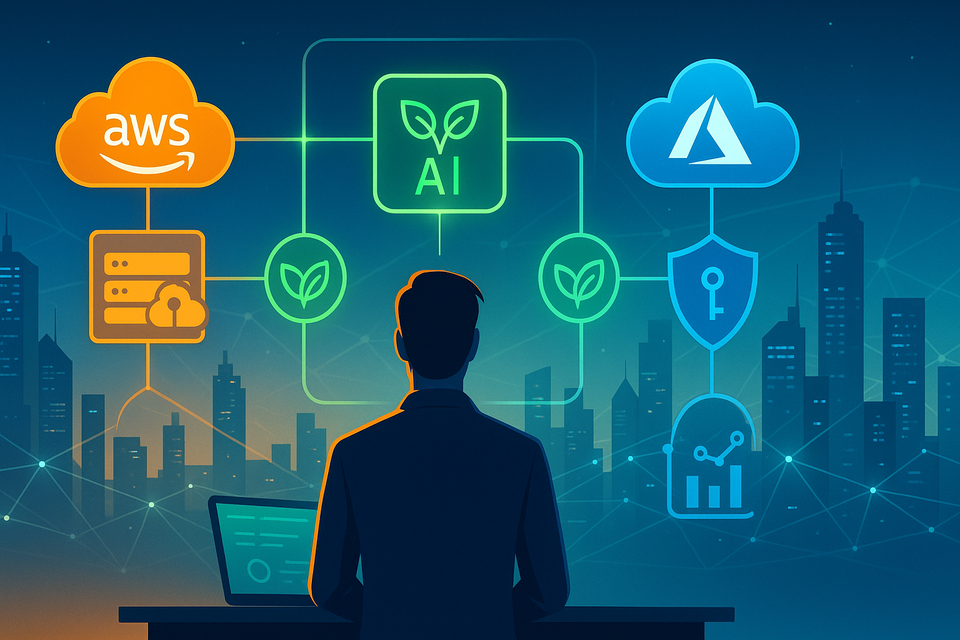AWS vs Microsoft Certifications (Session 1): Why Cloud Certifications Matter in 2025
In 2025, cloud certifications have become the digital currency of career growth. Whether you’re aiming for a higher salary, a promotion, or a shift into cloud engineering, understanding the “why” behind AWS and Microsoft certifications is the first step.

The essential guide to understanding the value, trends, and career potential of AWS and Microsoft certifications in the modern IT world.
In 2025, cloud certifications have become the digital currency of career growth. Whether you’re aiming for a higher salary, a promotion, or a shift into cloud engineering, understanding the “why” behind AWS and Microsoft certifications is the first step. This in-depth article explains their importance, benefits, and how they shape the future of tech careers.
1. The Cloud Revolution: Why Certifications Became a Career Catalyst
The past decade transformed how companies think about technology.
Where once on-premise servers and local storage were the standard, cloud computing has become the foundation of nearly every digital service.
Today, nearly every modern application — from Netflix to Zoom — runs in the cloud.
With this transformation, a massive demand has emerged for qualified cloud professionals who can manage, secure, and optimize these systems.
That’s where certifications come in.
Cloud certifications are no longer just “nice-to-have” badges; they are career accelerators that validate your skills in a measurable, globally recognized way.
They tell employers one key message:
“I know how to build, deploy, and manage cloud systems that work.”
Two companies dominate this certification space:
Amazon Web Services (AWS) and Microsoft (Azure).
Both offer structured, evolving learning paths that align perfectly with the real-world roles organizations need — from cloud architects and developers to DevOps and security experts.
2. What Are Cloud Certifications, Really?
Let’s define it simply:
A cloud certification is an official credential proving you can work effectively with cloud technologies.
These certifications are designed to:
- Validate your technical knowledge (how the cloud works)
- Demonstrate hands-on ability (how to apply it)
- Build your credibility (so employers can trust your expertise)
Unlike traditional degrees, certifications are skill-based, updatable, and industry-specific.
They focus on practical knowledge, such as:
- Setting up virtual networks
- Managing access and security
- Automating infrastructure
- Optimizing cloud costs
- Deploying scalable applications
The cloud world moves fast — and certifications move with it.
AWS and Microsoft both update their exams regularly to align with new tools, AI integrations, and business requirements.
3. Why Cloud Certifications Matter More in 2025
The year 2025 represents a new era for the global tech workforce.
AI, automation, and remote work have reshaped the industry, making digital fluency more valuable than ever.
According to multiple global job surveys, over 70% of IT hiring managers now prioritize candidates with cloud certifications over those without them.
Why? Because certifications are:
- Objective: They prove competence without requiring trust or guesswork.
- Current: Updated frequently to match the latest technologies.
- Practical: Focused on solving real-world problems.
In other words, having a cloud certification isn’t just about knowing theory — it’s about being job-ready today.
Key advantages of getting certified in 2025:
- Career Resilience: The cloud is no longer optional — it’s a global standard.
- Higher Salary Potential: Certified professionals earn, on average, 15–25% more.
- Job Mobility: Certifications are recognized internationally.
- Faster Promotions: Certified employees are often first in line for senior roles.
- Proof of Continuous Learning: Employers see certification as commitment to professional growth.
4. The Global Cloud Market Landscape
To understand why AWS and Microsoft certifications dominate, let’s look at the global picture.
| Provider | 2025 Market Share | Key Strength |
|---|---|---|
| Amazon Web Services (AWS) | ~32% | Scalability, automation, global infrastructure |
| Microsoft Azure | ~27% | Enterprise integration, hybrid cloud, security |
| Google Cloud Platform (GCP) | ~10% | AI and data analytics |
| Others (IBM, Oracle, etc.) | ~31% | Specialized or niche services |
AWS remains the leader in cloud adoption, especially among startups, SaaS platforms, and global enterprises.
Microsoft Azure, however, has seen the fastest growth rate, fueled by enterprise integration (Office 365, Power BI, Dynamics) and hybrid deployments.
This healthy competition between AWS and Microsoft has led to one great outcome for IT professionals:
→ More opportunities, more learning paths, and more demand for certified experts.
5. The Certification Ecosystem Explained
Both AWS and Microsoft offer structured, tiered certification systems that correspond to real-world career progression.
The AWS Certification Model
AWS organizes its certifications into four levels:
- Foundational – Basic understanding of cloud and AWS principles.
- Associate – Hands-on experience with specific AWS services.
- Professional – Advanced expertise for architects and engineers.
- Specialty – Focused knowledge (AI, Security, Networking, etc.).
This laddered system means you can start at any level, depending on your experience — though most professionals begin with the AWS Cloud Practitioner exam.
The Microsoft Certification Model
Microsoft’s system is role-based, aligning certifications to real job titles:
- Fundamentals – Cloud basics and Azure principles.
- Associate – Role-specific certifications (e.g., Azure Administrator, Developer).
- Expert – Advanced, cross-domain certifications (e.g., Solutions Architect, DevOps).
- Specialty – Deep specialization in security, AI, or hybrid systems.
This model helps professionals map their learning directly to their job role, rather than only mastering one platform.
6. How Certifications Drive Real Career Growth
Let’s look at practical benefits. Cloud certifications can significantly impact your professional trajectory.
1. Salary Growth
Certified professionals often see a 15–25% average pay increase compared to non-certified peers.
A certified AWS or Azure Architect can command salaries exceeding $130,000 per year in many global regions.
2. Promotion & Leadership Opportunities
Employers use certifications as an indicator of initiative and leadership potential.
Someone who invests in their learning is more likely to manage complex projects or mentor teams.
3. Access to High-Demand Roles
Top roles that prioritize certification include:
- Cloud Architect
- DevOps Engineer
- Site Reliability Engineer (SRE)
- Security Engineer
- Data Engineer
- Cloud Consultant
4. Professional Credibility
A certification is a universal signal of credibility — especially when switching industries or freelancing.
It’s tangible proof of what you know and can do.
7. AWS vs Microsoft: The “Why” Behind Their Certifications
Why AWS Certifications Exist
AWS created its certification program to standardize cloud expertise.
With hundreds of services across computing, networking, storage, and machine learning, the ecosystem is complex.
Certification helps employers ensure that AWS professionals can manage this complexity effectively.
AWS certifications are designed for:
- Builders (developers, architects)
- Operators (admins, DevOps engineers)
- Specialists (security, data, AI)
They reward depth of knowledge and real-world application.
Why Microsoft Certifications Exist
Microsoft’s certifications serve a slightly broader purpose: they validate role-based skills across multiple platforms — not just Azure.
This means they include:
- Azure cloud infrastructure
- Microsoft 365 and Office integrations
- Power Platform and Dynamics 365
- Cybersecurity and compliance
Microsoft focuses on business integration — connecting the cloud with collaboration tools, analytics, and productivity systems.
That’s why Azure certifications are especially popular among enterprise engineers and IT managers.
8. The Psychological Value of Being Certified
Beyond pay and job titles, certifications offer something equally important: confidence.
When you prepare for and pass a challenging exam, you experience three key shifts:
- You feel capable. You can handle real-world problems with clarity.
- You feel credible. Your peers and employers see you as an authority.
- You feel motivated. One certification often leads to another — learning becomes addictive.
Cloud certifications also connect you with a community.
Thousands of professionals share their learning experiences on forums, social networks, and study groups, creating a culture of mentorship and support.
9. Are Certifications Replacing Traditional Degrees?
Not entirely — but they are reshaping the definition of education.
Universities still play a crucial role in foundational computer science knowledge.
However, the speed of technological change makes academic programs struggle to keep up.
Certifications bridge that gap.
They provide up-to-date, industry-aligned skills in months — not years.
This makes them ideal for:
- Career switchers entering tech
- Professionals seeking to modernize their skill sets
- Students wanting a faster route to employment
In 2025, many tech recruiters consider certifications equal or even superior to traditional degrees for technical roles.
10. How Certifications Shape the Future of Work
As automation and AI continue to evolve, cloud skills are becoming the foundation for every digital role.
Even non-technical positions now require some understanding of cloud platforms.
The rise of multi-cloud environments — where organizations use both AWS and Azure — has further increased the value of certified professionals who can bridge both ecosystems.
In essence:
- Certifications = Skills
- Skills = Employability
- Employability = Security and growth
11. Challenges and Misconceptions
While certifications offer incredible advantages, it’s important to stay realistic.
Common misconceptions:
- “Certifications guarantee a job.”
Not automatically. They open doors, but experience and soft skills still matter. - “I can pass without hands-on practice.”
AWS and Microsoft exams are scenario-driven; real-world experience is essential. - “All certifications are equal.”
Some certifications carry more weight depending on industry and region. For example, AWS is stronger in startups, Microsoft in enterprises.
Challenges to expect:
- Time commitment (100+ hours of study per exam)
- Keeping up with updates — both AWS and Microsoft modify exams frequently
- Cost of multiple exams (can exceed $500 for advanced paths)
Still, the benefits far outweigh these challenges.
12. The Human Element: Building a Growth Mindset
Certifications are not just about passing tests — they are about adopting a mindset of continuous learning.
In a world where technology changes monthly, adaptability is everything.
Employers no longer reward “what you know” — they reward how fast you learn.
Studying for certifications cultivates:
- Problem-solving discipline
- Persistence
- Analytical thinking
- Curiosity about technology
And these soft skills are precisely what separate average engineers from top performers.
13. Practical First Steps Toward Certification
If you’re inspired to begin your journey, start small but strategic.
Step 1 – Define Your Goal
Decide what you want:
- Do you want to enter cloud computing?
- Do you want to level up in your current IT role?
- Or do you want to pivot to a new field entirely (like AI or security)?
Step 2 – Choose the Right Platform
If your company or clients use Microsoft tools → go for Azure.
If you want flexibility across industries → go for AWS.
If you’re aiming for long-term leadership → learn both.
Step 3 – Pick Your Starting Level
- Beginner: Cloud Practitioner (AWS) or Azure Fundamentals (AZ-900)
- Intermediate: Solutions Architect (AWS) or Azure Administrator (AZ-104)
- Advanced: Professional Architect (AWS) or Azure DevOps Expert (AZ-400)
Step 4 – Create a Study Schedule
Commit to at least 1 hour per day of consistent study, mixing:
- Video tutorials
- Practice labs
- Official documentation
- Mock exams
Step 5 – Engage with the Community
Join study groups on Reddit, Discord, or LinkedIn.
Learning is more effective when shared.
14. The Big Picture: Certifications as a Career Investment
Think of certifications as assets, not expenses.
They compound over time — each one increasing your value and opening new doors.
A single exam might cost $150, but the knowledge it represents can increase your lifetime earnings by tens of thousands of dollars.
Just like financial investments, the earlier you start, the more you gain.
The cloud industry isn’t slowing down — and neither should you.
15. Conclusion: The Power of Certification in the Modern Era
In 2025, cloud certifications are more than professional checkboxes — they are proof of adaptability, skill, and ambition.
Whether you choose AWS or Microsoft, the real goal is the same:
to stay relevant, valuable, and forward-looking in a constantly changing world.
So, start now.
Learn, certify, grow — and let your credentials speak for your expertise.
Next in the Series:
Session 2 – Understanding AWS Certifications in Depth (2025 Edition)
We’ll explore the AWS certification levels, exam formats, salaries, and how to choose the perfect AWS path for your career.
#AWS #Azure #CloudComputing #Certification #CareerGrowth #Microsoft #DevOps #CloudEngineer #ITCareers #AmazonWebServices
Sponsored by Dargslan.com — Learn. Build. Grow.
At Dargslan Publishing, we empower IT professionals to advance their skills through expert-curated e-books, hands-on workbooks, and practical learning guides.
Whether you’re studying for your AWS Cloud Practitioner exam or mastering Microsoft Azure fundamentals, Dargslan offers the most up-to-date learning materials and real-world examples to help you succeed.
🎓 What you’ll find:
- 350+ books and digital resources across cloud, DevOps, and IT management
- Step-by-step certification prep workbooks
- Career-oriented learning roadmaps
- Multilingual editions for global learners
Explore all titles and start your certification journey today at dargslan.com.
🎁 Bonus Section
Free Tools and Resources to Kick-Start Your Cloud Career
Here’s a curated list of free and beginner-friendly resources you can use right now to begin your AWS or Microsoft certification path:
| Type | Resource | Description |
|---|---|---|
| Learning Platform | AWS Skill Builder | Free official AWS training modules and hands-on labs. |
| Learning Platform | Microsoft Learn | Guided Azure paths with sandbox environments to test your skills safely. |
| Practice Labs | Cloud Playground (free tier) | Deploy and test virtual cloud environments at no cost. |
| Community Forum | Reddit r/AWSCertifications / r/Azure | Peer advice, study groups, and exam feedback. |
| Planner Tool | Trello or Notion Study Tracker | Organize your certification roadmap and set deadlines. |
💡 Pro Tip:
Create a simple weekly plan — for example:
- Monday–Wednesday → Theory learning
- Thursday → Hands-on practice
- Friday → Review and mock exam
Consistency matters more than intensity. Five hours a week is enough to start seeing progress.
🧭 Next Step
Continue to Session 2 – Understanding AWS Certifications in Depth (2025 Edition)
→ We’ll explore each AWS certification level, real salary expectations, and which path fits your goals best.




